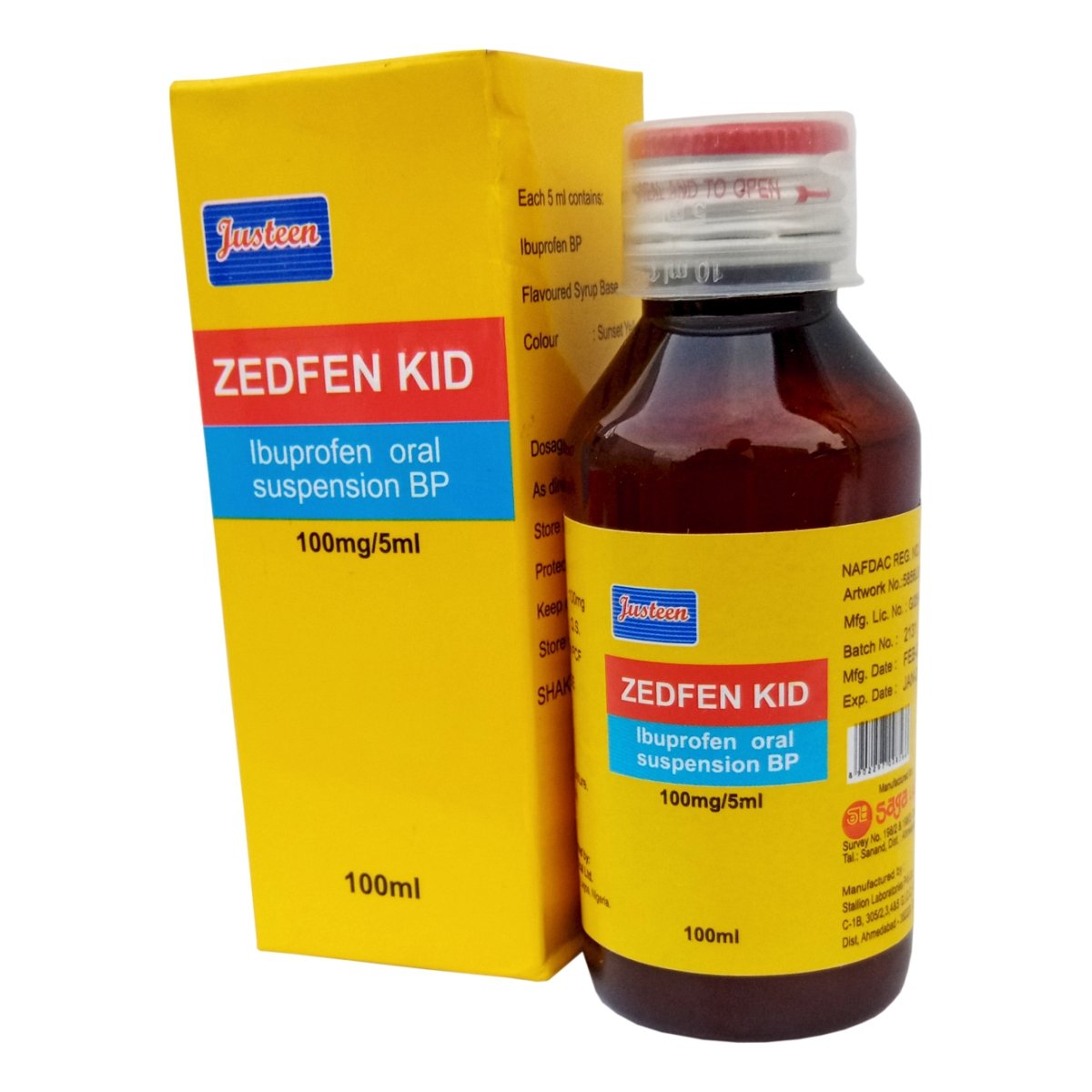
Zedfen
ZEDFEN KID
Ibuprofen Oral Suspension BP
-
QUALITATIVE AND QUANTITATIVE COMPOSITION
Each 5 ml contains:
Ibuprofen BP: 100 mg
Flavoured Syrup Base: Q.S.
Colour: Sunset Yellow FCF
Approved colour used in capsule shell.
-
PHARMACEUTICAL FORM
Suspension:
For oral administration. -
CLINICAL PARTICULARS
Therapeutic indications
For the relief of headaches including tension headaches and migraine, rheumatic and muscular pains, period pains, backache, neuralgia, toothache, feverishness and symptoms of colds and flu.Posology and method of administration
Children:
Juvenile Rheumatoid Arthritis - 20 mg/kg of body mass daily in divided doses with up to 40 mg/kg being given daily if necessary. zedfen kid is not recommended for children under 1 year of age or in those weighing less than 7 kg.Pain:
5 mg/kg of body mass. A second dose of 5 mg/kg may be given after 2 hours if pain is not controlled, thereafter 5 mg/kg every 4-6 hours. If pain persists for more than 7 days, consult your physician.Fever:
5 mg/kg of body mass every 4-6 hours If fever persists more than three days consult your doctor.Age Daily Dosage Body Mass
1-2 years 2.5 mL 3-4 times daily 7-12 kg
3-7 years 2.5-5 mL 3-4 times daily 14-23 kg
8-12 years 10 mL 3-4 times daily 25-40 kg
Contraindications
It should be given with care to patients with peptic ulceration or a history of such ulceration, bleeding disorders, cardiovascular disease and those on oral anticoagulants. It should not be given to patients who are sensitive to aspirin. Zedfen Kid should be administered with care in patients with asthma, especially those who have developed bronchospasm with other non-steroidal agents.Special warnings and precautions for use
WARNINGS:
This product contains sucrose - Patients with rare hereditary problems of fructose intolerance, glucose-galactose malabsorption or sucrose-isoma-ase insufficiency should not take this medicine. Patients having Diabetes should not take this medication. Safety in pregnancy has not been established.PRECAUTIONS:
Ibuprofen should be given with care to patients with asthma or bronchospasm, bleeding disorders, cardiovascular disease, peptic ulceration or a history of such ulceration, renal failure, and in those who are receiving coumarin anticoagulants. Patients who are sensitive to aspirin should generally not be given Ibuprofen.Interaction with other medicinal products and other forms of interaction
NSAIDS may enhance the effect of anti-coagulants and diminish the effect of anti-hypertensives or thiazide diuretics. Concurrent aspirin or other NSAIDS may result in an increased incidence of adverse reactions.Pregnancy and lactation
Whilst no teratogenic effects have been demonstrated in animal experiments the use of Ibuprofen tablets during pregnancy should, if possible, be avoided. The onset of labour may be delayed and its duration increased. In the limited data available, Ibuprofen appears in the breast milk in very low concentrations and is unlikely to affect the breast-fed infant adversely.Undesirable effects
Lyspepsia and nausea have been reported, and very rarely a skin rash. Increased values for serum transaminases have followed treatment with Ibuprofen. Vomiting, diarrhoea and occasionally stomatitis, melaena or gastro-intestinal haemorrhage, oedema, tinnitus, depression, drowsiness and insomnia can occur.
Increased values for serum glutamic pyruvic transaminase, bilirubin and alkaline phosphatase have been reported but have often returned to normal, despite continued treatment.
Thrombocytopenia, agranulocytosis and impairment of renal function has also been reported. Headache, dizziness, nervousness and other central effects occur in some patients and alterations in hepatic function tests have been noted.
Decreased visual acuity and visual-field defects have also occurred. Acute reversible renal failure has been reported. Ibuprofen should be used with care in patients with impaired renal function.
Overdose
The symptoms of overdose include headache, vomiting, drowsiness and hypertension. Gastric lavage and correction of severe electrolyte abnormalities should be considered. There is no specific antidote to ibuprofen overdosage. -
5. PHARMACOLOGICAL PROPERTIES
Pharmacodynamic Properties
Ibuprofen is a phenylpropionic derivative. It has useful anti-inflammatory, analgesic and antipyretic activities. Its anti-inflammatory effects in rheumatoid arthritis are inferior to those of full doses of aspirin. In low dosage Ibuprofen may provide relief of pain without objective anti-inflammatory effect.
Ibuprofen is absorbed from the gastro-intestinal tract and peak concentrations in the circulation occur about 11/2 hours after ingestion. Ibuprofen is extensively bound to plasma proteins and has a half-life of about 2 hours. It is rapidly excreted in the urine; about 60% of a dose is recovered in the urine as metabolites and their conjugates.
It is believed that some Ibuprofen may be excreted in the faeces possibly after excretion in the bile.
Pharmacokinetic properties
Ibuprofen is absorbed from the gastrointestinal tract and peak concentrations in the circulation occur about 1.5 hours after ingestion. Ibuprofen is extensively bound to plasma proteins and has a half-life of about 2 hours. It is rapidly excreted in the urine; about 60% of a dose is recovered in the urine as metabolites and their conjugates. It is believed that some ibuprofen may be excreted in the faeces possibly after excretion in the bile. -
6.PHARMACEUTICAL PARTICULARS
Special precaution for storage
Store in a well closed container. Store below 30?C.
KEEP OUT OF REACH OF CHILDREN


